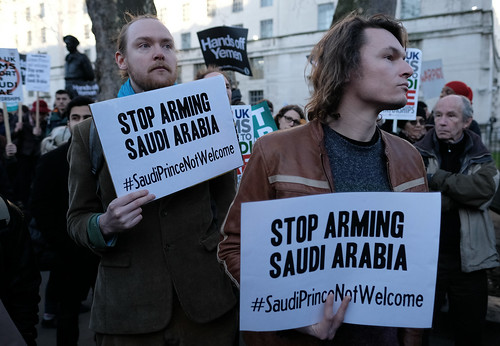From Common Dreams
By Medea Benjamin, Nicolas J.S. Davies
So long as U.S. leaders continue to coddle the Saudis, it's difficult not to ask who is more evil -- the maniacal Saudi crown prince or the mendacious Western governments and businesspeople who support him?
MBS's ascent to dictatorial power, soon after his elderly father King Salman became king in January 2015, was sold to the world as ushering in a new era of reform, but has in reality been characterized by violent, ruthless repression. The
The Trump administration has never challenged Saudi Arabia's internal repression, and worse yet, it has played a vital role in the brutal Saudi-led war on neighboring Yemen. After Yemeni president Abdrabbuh Mansur Hadi failed to leave office at the end of his two-year term as the head of a transitional government, or to fulfill his mandate to draw up a new constitution and hold a new election, the Houthi rebel movement invaded the capital, Sana'a, in 2014, placed him under house arrest and demanded that he do his job.
Hadi instead resigned, fled to Saudi Arabia and conspired with MBS and the Saudis to launch a war to try to restore him to power. The United States has provided in-air refueling, intelligence and planning for Saudi and Emirati air strikes and has raked in over 100 billion dollars in arms sales. While U.S. support for the Saudi war began under President Obama, Trump has provided unconditional support as the horrors of this war have shocked the entire world.
According to the Yemen Data Project, at least 30% of US-supported airstrikes on Yemen have hit civilian targets, including hospitals, health clinics, schools, marketplaces, civilian infrastructure, and a particularly horrific airstrike on a school bus that killed 40 children and 11 adults.
After five years, this brutal war has succeeded only in wreaking mass devastation and chaos, with dozens of children dying every day from starvation, malnutrition and preventable diseases, all now compounded by the COVID-19 pandemic.
Belated Congressional efforts to end U.S. support for the war, including the passage of a War Powers bill in March 2019 and a bill to suspend arms sales to Saudi Arabia in July 2019, have been vetoed when they reached President Trump's desk.
The U.S. alliance with the Saudis certainly predates Trump, going back to the discovery of oil in the 1930s. While it's traditional role as an oil supplier is no longer vital to the U.S. economy, Saudi Arabia has become one of the largest purchasers of U.S. weapons, a major investor in U.S. businesses and an ally against Iran. After the failed U.S. wars in Afghanistan and Iraq, the U.S. began grooming Saudi Arabia to play a leading geopolitical and military role, alongside Israel, in a new U.S.-led alliance to counter the growing influence of Iran, Russia and China in the Middle East.
President Obama tried to change tack towards the end of his administration, putting a hold on the sale of munitions to Saudi Arabia and signing a nuclear deal with Iran. Trump reversed both these policies, and continued to treat Saudi Arabia as a critical ally, even as the world recoiled in horror at Khashoggi's assassination.
While Saudi abuses have not diminished the Trump administration's unconditional support, they have ignited global opposition. In an exciting new development, exiled Saudi activists have formed
Another new initiative, timed for the second anniversary of Khashoggi's murder, is the launch of Democracy for the Arab World Now (DAWN), an organization conceived by Jamal Khashoggi several months before his murder. DAWN will promote democracy and support political exiles across the Middle East, in keeping with the vision of its martyred founder.
These past two years have also seen activists organizing boycotts of Saudi events. Pre-COVID, when the kingdom opened up to musical extravaganzas, groups such as CODEPINK and Human Rights Foundation pressured entertainers like Nicki Minaj to cancel appearances. Minaj put out a statement saying, "It is important for me to make clear my support for the rights of women, the LGBTQ community and freedom of expression." Meghan MacLaren, the U.K.'s top woman golfer, withdrew from a lucrative new golf tournament in Saudi Arabia, citing reports by Amnesty International and saying she cannot take part in "sportwashing" Saudi human rights abuses.
But as long as U.S. leaders continue to coddle the Saudis, it's difficult not to ask who is more evil -- the maniacal Saudi crown prince responsible for Khashoggi's murder and the slaughter of more than a hundred thousand Yemenis, or the mendacious Western governments and businesspeople who continue to support and profit from his crimes.
(Note: You can view every article as one long page if you sign up as an Advocate Member, or higher).






